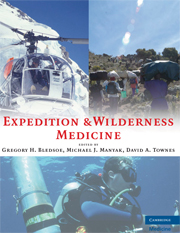Book contents
- Frontmatter
- Contents
- Contributors
- Foreword
- Preface
- Acknowledgments
- PART I EXPEDITION PLANNING
- PART II EXPEDITIONS IN UNIQUE ENVIRONMENTS
- PART III ILLNESS AND INJURIES ON EXPEDITIONS
- 24 General Medical
- 25 The Diarrhea of Travelers
- 26 Malaria: Diagnosis, Prevention, and Treatment for the Traveler
- 27 Wild Animal Attacks and Injuries
- 28 Snake and Arthropod Envenoming
- 29 Hazardous Marine Life
- 30 Expedition Toxicology
- 31 Environmental Injuries
- 32 Penetrating and Explosive Wounds
- 33 Drowning and Submersion Injury
- 34 Evaluation and Acute Resuscitation of the Trauma Patient
- 35 Principles and Practice of Expedition Wound Management
- 36 Expedition Eye Injuries and Disorders
- 37 Dental Medicine on Expedition
- 38 Foot Injuries
- 39 Expedition Orthopedics
- 40 Expedition Self-Rescue and Evacuation
- 41 Aeromedical Evacuations
- APPENDIX The Expedition Medical Kit
- Index
30 - Expedition Toxicology
from PART III - ILLNESS AND INJURIES ON EXPEDITIONS
Published online by Cambridge University Press: 05 March 2013
- Frontmatter
- Contents
- Contributors
- Foreword
- Preface
- Acknowledgments
- PART I EXPEDITION PLANNING
- PART II EXPEDITIONS IN UNIQUE ENVIRONMENTS
- PART III ILLNESS AND INJURIES ON EXPEDITIONS
- 24 General Medical
- 25 The Diarrhea of Travelers
- 26 Malaria: Diagnosis, Prevention, and Treatment for the Traveler
- 27 Wild Animal Attacks and Injuries
- 28 Snake and Arthropod Envenoming
- 29 Hazardous Marine Life
- 30 Expedition Toxicology
- 31 Environmental Injuries
- 32 Penetrating and Explosive Wounds
- 33 Drowning and Submersion Injury
- 34 Evaluation and Acute Resuscitation of the Trauma Patient
- 35 Principles and Practice of Expedition Wound Management
- 36 Expedition Eye Injuries and Disorders
- 37 Dental Medicine on Expedition
- 38 Foot Injuries
- 39 Expedition Orthopedics
- 40 Expedition Self-Rescue and Evacuation
- 41 Aeromedical Evacuations
- APPENDIX The Expedition Medical Kit
- Index
Summary
INTRODUCTION
In the international wilderness and expedition setting, familiarization with commonly prescribed and abused drugs available to a specific region or group of people is important. Expanded urbanization and worldwide travel has increased illegal drug trafficking exponentially. Awareness of prescription medications any expedition team members may be taking is essential. Additionally, the expedition health care provider should be familiar with the poisonous plants, mushrooms, natural toxins, herbal products, and venomous creatures indigenous to the area of exploration and travel.
The poisoned victim may present with a variety of clinical symptoms including dermatologic changes, gastroenteritis, altered mental status, seizures, cardiac dysrhythmias, and respiratory distress. In many cases, during the initial management, the offending agent is unknown. To complicate matters, a large percentage of overdoses involve multiple drugs, making the diagnosis of the primary causal agent more challenging. Accidental environmental exposures and natural toxins may add to or complicate the presentation of a poisoned victim.
In developing countries and in the remote wilderness, access to medicinal agents is limited. Advanced treatment modalities commonly available in industrialized nations (antidotes, ventilators, dialysis equipment, intensive care units) are usually unavailable in underdeveloped countries or in the expedition environment. Therefore, the provider must be resourceful and, at times, creative. Fortunately, the majority of poisonings can be treated by removing the patient form the source of exposure, taking general decontamination measures, and offering supportive care. In adverse weather conditions, providing shelter away from the elements also represents an essential aspect of supportive care.
- Type
- Chapter
- Information
- Expedition and Wilderness Medicine , pp. 436 - 478Publisher: Cambridge University PressPrint publication year: 2008



